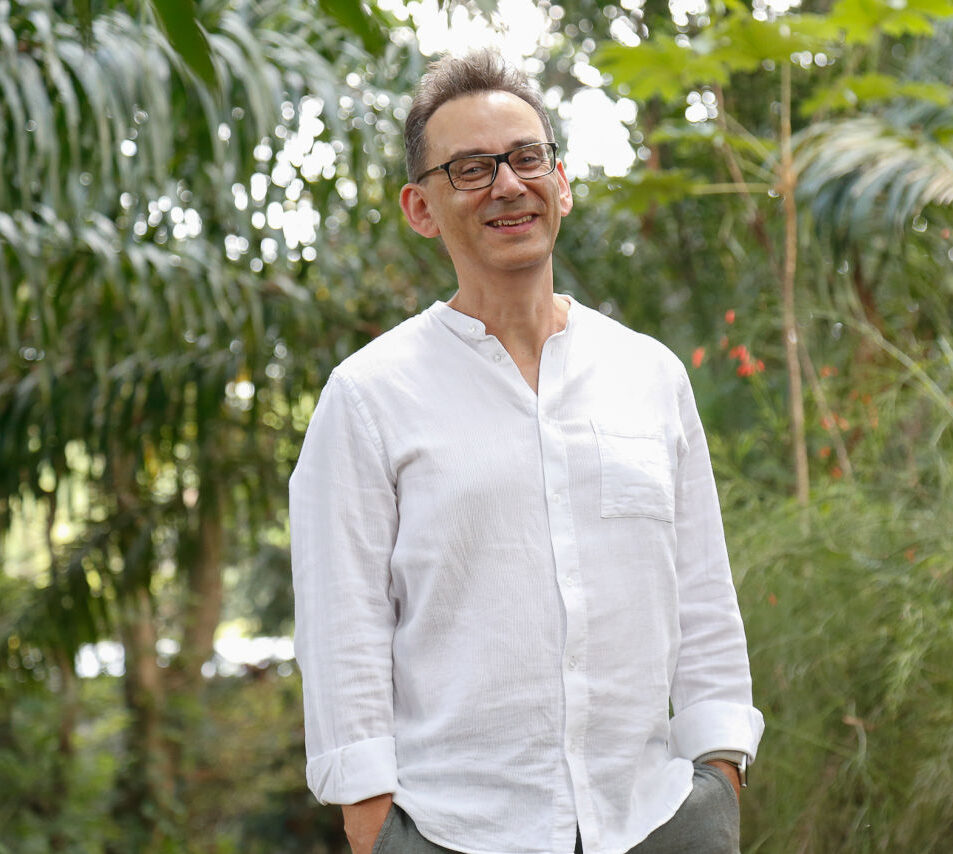Jean-Paul Metzger: The ecologist in the landscape
In residence in Montpellier in the fall of 2023 thanks to the UM's MAK'IT (Montpellier Advanced Knowledge Institute on Transitions) program, ecologist Jean-Paul Metzger, professor at the University of São Paulo, has continued his research linking ecology and quality of life with his French counterparts.

Accomplished scientists fall into two categories: those perched in their ivory towers and those who share their enthusiasm for their research over coffee. Jean-Paul Metzger, a professor at the University of São Paulo, belongs to the latter group. His innovative thesis on the fragmentation of tropical forests quickly propelled him into the ranks of renowned ecologists. The topic, which was still new in 1995 when he obtained his doctorate, became very fashionable, and his work became a reference on the concepts of connectivity and ecological corridors. He was one of the first to document how landscape fragmentation and the isolation of natural areas—due to human activities—lead to a loss of biodiversity. A particular issue was the inability of species to recolonize isolated areas. "It wasn't just a matter of recording the loss of individuals and species, but also of understanding how landscapes influence biodiversity and how to maintain or restore it," explains the researcher.
Jean-Paul Metzger became interested in landscape ecology while pursuing a postgraduate degree integrated into a UNESCO chair and linked to the Paris Institute of Agronomy, the University of Toulouse, and the University of Montpellier. For the young biologist, "landscape ecology and satellite imagery were all very new." When he first came to live in France, the Franco-Brazilian student had no intention of continuing in research after completing his degree in land use planning. But, against all odds, the academic world proved easier to enter than the job market. "In Brazil, the early 1990s were marked by crisis under the government of Fernando Collor. I had no job prospects. However, I did find Brazilian funding to pursue a PhD," says the scientist. Enrolled in Toulouse, he wrote his thesis on the Atlantic Forest, a tropical forest that runs along the entire Brazilian coast: "I became passionate about my subject, and my taste for research came to me as I was doing it." And the academic world rewarded him, as he immediately obtained a position at the University of São Paulo at the age of 31.
Rain gardens
After focusing on human impacts on ecosystems, Jean-Paul Metzger turned his attention to the services that ecosystems provide to humans. In other words, ecosystem services, an approach to the economic assessment of biodiversity that has become a major focus in ecology in the 2000s. He is working on coffee crops that cannot do without pollinators, as pollination is an essential service provided by bees to crops. Always in tune with the scientific concepts of the moment, the biologist is now working on nature-based solutions and the concept of One Health, the latest research developments reminding humans that they must learn to live with the rest of the living world. He is particularly interested in science-society issues. In São Paulo, he has assembled a team of around 100 people, including researchers, activists, and local government officials, to co-create solutions to the environmental problems facing the state of São Paulo.
This small group works according to a knowledge synthesis approach, a participatory approach that relies on the collective to draw new research avenues and practical responses to the problems posed from the analysis of available data. One of the proposals that emerged from this work to improve the quality of life of city dwellers and the resilience of their cities to climate change is the installation of new rain gardens, urban green spaces that capture runoff water. "These mini water retention areas reduce the risk of flooding. The vegetation also provides shade and coolness in a city where temperatures are currently rising to 40°C, and filters pollution. But it is also the quality of the landscape and the beauty of the surroundings that contribute to improving mental health." The positive psychological effect on city dwellers of living near parks is now recognized by numerous scientific studies.
Scenic beauty and urban health
Mobilized by the climate plan of the state of São Paulo, another proposal has emerged to reconcile climate change adaptation and mitigation. Locating afforestation projects to capture carbon on the outskirts of cities, because restoring peri-urban environments, particularly in areas at risk of flooding and landslides, has an immediate beneficial effect for local residents. "In particular, this can prevent the establishment of slums in steep areas or flood plains, where landslides and flooding pose a danger to life," explains Jean-Paul Metzger, who is deeply concerned about land use planning.
And what about his move to France at the end of 2023? The opportunity to spend three months in Montpellier as part of the UM's MAK'IT (Montpellier Advanced Knowledge Institute on Transitions) program sparked his interest in joining a renowned scientific community specializing in ecology and tropical agronomy. But it was ultimately at the Center for Synthesis and Analysis of Biodiversity (Cesab)—the FRB's flagship program—that the researcher was able to start real collaborations. He leaves behind a Brazilian doctoral student, Douglas Cirino, who is using the analytical tools developed by Cesab to advance his research on the links between scenic beauty and urban health. As for Cirino, the proximity of Pic Saint-Loup and the Montpellier hinterland greatly contributed to his well-being, far from the megacity of more than 12 million Paulistanos.
